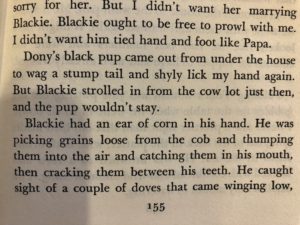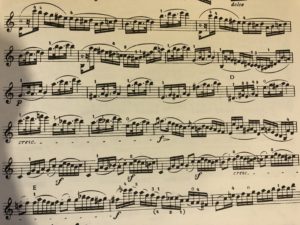Reading linguistic words and reading musical notes are two fundamentally different activities with two entirely different outcomes. Reading words results in mental ideas (Dony has animals!), which lead to further ideas (Is this on a farm?). Reading notes results physical action (Right arm bow-stroke! Left hand fingering!), which leads to sound (Ringing “C”?).
Reading notes results physical action (Right arm bow-stroke! Left hand fingering!), which leads to sound (Ringing “C”?).  Pausing the eye at commas, periods, unknown vocabulary, is inherent to the process of reading words and forming ideas. Continuous forward eye-motion is inherent to reading notes, to render the on-going pulse of music. The neurological process of reading words can be fraught, think dyslexia, and so can the process of reading notes. Personally, while I have no issues reading words, I have come to notice a number of difficulties reading music. Here are some of them:
Pausing the eye at commas, periods, unknown vocabulary, is inherent to the process of reading words and forming ideas. Continuous forward eye-motion is inherent to reading notes, to render the on-going pulse of music. The neurological process of reading words can be fraught, think dyslexia, and so can the process of reading notes. Personally, while I have no issues reading words, I have come to notice a number of difficulties reading music. Here are some of them:
My eye does not physically scan continually forward across the staff at a continuous rate. It pauses at anything it doesn’t quickly recognize, as it might in reading a sentence. Encountering an uncomfortable notational figure, my eye may try to loop back over it seeking familiarity. In a familiar piece, my eye might lag behind the notes being played. If my eye has paused, and muscle memory has carried the phrase forward, my eye will frantically scramble looking to catch up. Any of these erratic actions interfere with the essential forward momentum of the music.
Aside from eye-motion, as if failing to distinguish between the letters “C” and “G” (is that COT or GOT?), sometimes I can’t identify a note in passing: they look too similar to me on the staff. Associated with this issue is a visual illusion of the staff is shifting up or down behind the notes, so a D can change into an F, or vice-versa.
Reading problems interfere with making music, as they typically cause me to freeze mid-play, and the pulse stops, and the sound stops, and the music stops. Everyone who has ever worked with me has noticed the problem. “Just keep going. Don’t stop.” is the predominant instruction. This is like taking someone who has never seen snow to the top of a ski-hill and telling them “Just keep going. Don’t stop.” What they would end up doing would hardly be called skiing.
Reading problems also cause me intense anxiety. When I go to play a piece that I’ve studied well, I know reading mistakes will crop up randomly, interfering with the performance. I can’t seem to practice my way out of them. It is like cooking in my too-familiar kitchen and today I can’t remember where the salt and the bowls are, and tomorrow I can’t remember where where the butter and the knifes are. So each time I start to cook I know I’ll forget something, but I don’t know what that something will be.
If there is a dyslexia of reading music notation, I have it.
In the world of reading-words instruction, there is an abundance of research and pedagogy to mitigate reading difficulties cause by neurological mis-processing. Does any such research and pedagogy exist for reading-notes? My guess is no. Typically, people who fail to progress at making music learn to quit trying, or drop out. I find this sad, and I refuse to capitulate. If there are best practices for alleviating note-reading difficulties, I hope to find them. In the meantime, I continue to practice and explore and see what I can figure out on my own.
Copyright 2018, All rights reserved.

I can totally relate to these difficutiedin reading sheet music. I find it helpful “read” through the sheet trying to quietly hum the tune to myself
Another problem I have is trying to make my fingers go in the right position as I follow the notes
This us my biggest problem
Reading is actually a very complex skill. It wouldn’t surprise me if lots of people have problems.
I have these exact problems too. I’ve always attributed them to my ADHD, though.
Human brain neurology is complex and has many variations!
I have a similar problem, slightly reversed. I read the notes and my fingers are trained to do the right thing but I am unaware of the notes going up or down. My personal theory as an adult, our brain does what is easiest for it, our learning style, but that might not be what we need to learn….we need to learn in a different way that is not automatic or easy for us.
Very interesting, Ann. I think you are right – the adult brain wants do do what is easiest and most comfortable. In order for any significant learning to occur, we have to fight this tendency. Boy, is that difficult!.
Hi I arrived here after seeing your post at facebook group.
My personal experience is different. When I was little I learn organ and I get difficulty similar to what you write. I’m an introvert with a lot of thinking in brain, so I’m just guessing as a child I slow read notation because of that.
My adult experience with violin turn out to be different. Eventhough I still need processing time in reading notation, sometimes when I’m not thinking too much, hands can move and when I realize it, the movement suits the notation. This happens gradually so it’s like a mix between my too much thinking vs instinct.
Next thing I can share, memorize the parts can be helpful. In my case, I always fail to memorize but keep trying anyway. After couple of songs half memorized (that means I still cannot memorize all after trying it), the funny thing is, I gradually more easier to memorize my next homework. Maybe sometimes we just need to try and adjust with it? I still do not know.
Wish you the best in your journey…
Another resource, mightbe useful:
http://www.musicalfossils.com/wpmf/adults-have-difficulty-converting-notation-into-musical-flow/
Thank you, Fifi, for sharing your experience. Very interesting. And thank you for the very very interesting article link. It has some ideas to think about.
Kate, you described my music-reading problems almost exactly. Only exception is that I don’t have the visual illusion that the staff is moving. But I also relate to Fifi’s comment regarding over thinking. I need processing time for each note. I can’t just read F#, my mind reads F# and then goes into F is after E, must make sure my fingers are on the correct string, and to make it sharp I have to play it a bit higher but not too much… by the time I’m done thinking it over, I’ve ruined the moment to say the least.
My teacher encourages me to learn a piece by heart so I don’t have to read the notes and concentrate only on playing them. This works really well but the ironic part is that after I’ve learned a piece by heart and I’ve played it well without looking at the notes, if I go back to looking at the notes, there I go stumbling again!
It’s very frustrating and I’m starting to think that if I don’t find a solution fast, I’ll never be able to play anything longer than a few bars!
That is very interesting, Helene. My teacher is currently focusing on memorizing passages to help me build technique and play with forward momentum, without visual queues interfering. At the moment, I also experience stumbling when I return to reading after memorizing. My hope is that I will learn to study and then play a piece using the printed music only as reminders. Time will tell.
Fifi recommended this article: http://www.musicalfossils.com/wpmf/adults-have-difficulty-converting-notation-into-musical-flow/
I found this quote from it enlightening: “Adults tend to perceive notation as discreet, with each note representing one element, similar to perceiving each letter of a word as one element . . . It is in this combination of elements that problems emerge. Beginning adult students have difficulty converting the notation into the flow of music. They feel each note or chord is a task unto itself and this is apparent in the way they move their hands and arms.” I thought, “Wow! This describes me!” It was written in 2004 by a teacher of adult piano students.
Now the question: If this is a major stumbling block for adult musical-instrument learners, what are pedagogical best-practices to help them beyond this reading problem to achieve flow?
I read your blog section for today, Oct. 27, prior to reading this one and all the comments. I see myself in what many have said. It is so nice to know I am not alone with these problems. I began cello in 2009 and keep pushing forward, feeling that I am not progressing as much as I think I should be. And like so many of the responders to this topic, I overthink everything. My mind wanders as I play, causing lack of concentration. I cannot always tell what string I am on or which one I should be on. In spite of the frustrations, I keep on going because I just love making music.
I suspect all of these difficulties are actually very common for adult beginners. The path forward is to meet the challenges and enjoy the learning and the path forward.